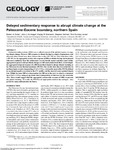Delayed sedimentary response to abrupt climate change at the Paleocene-Eocene boundary, northern Spain
Date
2019-01-08Author
Subject
Metadata
Show full item recordAbstract
Sediment routing systems (SRSs) are a critical element of the global response to ongoing climate change. However SRS response to climate forcing is complex, fragmentary, and obscured when viewed over short, human time scales (10 -1 -10 2 yr). Over long time scales ( > 10 2 -10 3 yr), the aggregated, system-wide response of SRSs to climate forcing can be gleaned with more confidence from the sedimentary record, but the nature and time scales of this aggregated response to abrupt climate change are still poorly understood. Here, we investigate the aggregated temporal response of a SRS in northern Spain to abrupt climate warming at the Paleocene-Eocene thermal maximum (PETM). Our results show that terrestrial sites in northern Spain record a temporal lag of 16.5 ± 7.5 k.y. between the onset of the PETM, defined by an abrupt negative excursion in the δ 13 C profile, and the onset of coarse-grained deposition. Within the same SRS at a deep marine site 500 km to the west, we observe a temporal lag of 16.5 ± 1.5 k.y. using an age model that is independent of that used for the terrestrial sites. These results suggest that the aggregated, system-wide response of SRSs to presentday global warming-if we take the PETM as an appropriate modern-day analogue-may persist for many millennia into the future.
Publisher
Journal
Volume
Issue
Pagination
Recommended, similar items
The following license files are associated with this item:


